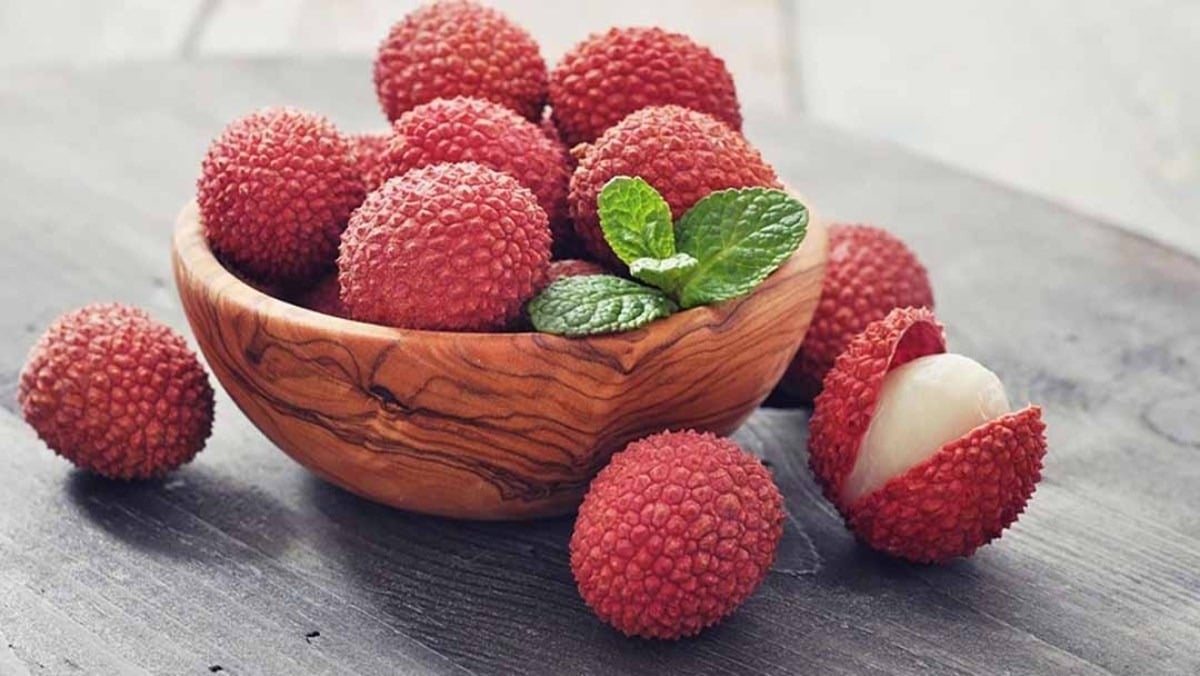Why Lychees Can Cause Internal Heat and Acne
Lychees are a delicious and nutritious fruit, packed with natural sugars, vitamin C, fiber, and antioxidants. However, according to Eastern medicine, they possess a warming property, and consuming too many lychees can increase body temperature, leading to a condition known as “internal heat.” Common symptoms include mouth ulcers, acne breakouts, dry throat, and a general feeling of discomfort.
The high content of fructose in lychees, if consumed in excess, can also impact digestion and increase the likelihood of acne breakouts in individuals with sensitive skin.
The main reason why lychees can cause internal heat lies in overeating this fruit. Many people tend to eat a large quantity of lychees in one sitting, especially when hungry, which can overwhelm the body. Additionally, not pairing lychees with the right foods or habits can further exacerbate the potential health risks.

Selecting Fresh and High-Quality Lychees
To safely enjoy lychees, start by choosing fresh and ripe fruits. High-quality lychees not only ensure better flavor but also reduce the risk of irritation. Look for lychees with bright red, plump skin, free from any bruises or odd odors. Lychees picked straight from the tree usually have a subtle fragrance, a delicate sweetness, and are less likely to cause internal heat compared to those that are ripened artificially or stored for extended periods.
Additionally, opt for lychees sourced from renowned growing regions such as Luc Ngan in Bac Giang, known for their superior quality. Avoid lychees that have been soaked in chemicals or improperly stored, as these may pose health risks, increasing the chances of internal heat or allergic reactions.
Proper Ways to Eat Lychees to Avoid Internal Heat
1. Control Portion Sizes
One of the most important rules when eating lychees is moderation. According to nutritionists, adults should consume around 10-15 lychees per day, equivalent to 200-300 grams. For children, this number should be reduced to 5-7 lychees to prevent digestive issues.
Eating a moderate amount of lychees allows the body to absorb nutrients without an excess of sugar or a spike in body temperature. Spread your lychee intake throughout the day as snacks rather than consuming a large quantity at once.
2. Avoid Eating Lychees on an Empty Stomach
Consuming lychees when hungry can lead to a drop in blood sugar levels, causing dizziness and fatigue, especially in individuals with sensitive constitutions. Fructose in lychees takes time to metabolize, and an empty stomach may struggle to efficiently process this sugar. It’s best to eat lychees after a main meal or paired with light snacks to maintain nutritional balance.
3. Pair with Cooling Foods
To neutralize the warming nature of lychees, combine them with cooling foods according to Eastern medicine. Some suggestions include:
Green tea: Green tea is rich in antioxidants and has a cooling effect, helping to soothe the body after consuming lychees.
Sugar-free yogurt: Yogurt supports a healthy gut, aids digestion, and reduces the likelihood of acne breakouts.
Green vegetables: Vegetables like gotu kola and green mustard greens have cooling properties, making them ideal to eat alongside lychees or as part of a meal.
Staying adequately hydrated throughout the day is also an effective way to help the body dissipate excess heat and prevent internal heat buildup.
4. Timing Your Lychee Consumption
When you eat lychees is just as important as how much you eat. Avoid consuming lychees late in the evening, especially right before bedtime, as your digestion slows down during sleep, leading to a feeling of fullness or heat buildup. The ideal times to eat lychees are in the morning or during the afternoon when your body is more active and has better metabolic capabilities.
5. Precautions for Individuals with Sensitive Constitutions
Those prone to acne, with naturally warm constitutions, or managing conditions like diabetes or obesity should exercise caution when eating lychees. Consult with your doctor or nutritionist before indulging to ensure the amount you consume aligns with your health status. Additionally, pay attention to your body’s reactions after eating lychees and make adjustments as necessary.
Skin Care After Eating Lychees
Acne breakouts are a significant concern for many lychee lovers, especially those with oily or sensitive skin. To mitigate this risk, maintain a proper skin care routine:
Cleanse regularly: Use a gentle cleanser to remove excess oil and prevent acne.
Moisturize: Well-hydrated skin is less prone to irritation and excess oil production, reducing the likelihood of acne.
Stay hydrated: Water helps cool the body and supports skin health from within.
When enjoyed in moderation and paired correctly, lychees offer numerous health benefits. The vitamin C content boosts immunity and promotes healthy skin and anti-aging. The fiber in lychees supports digestive health and improves gut function. Furthermore, the antioxidants in lychees protect the body from environmental stressors.
The Ultimate Guide to Keeping Your Lychees Fresh and Juicy for Longer: A Tried and Tested Method to Prevent Discoloration and Maintain That Perfect Plumpness.
Luscious and delectable, plums are a delight to savor. They are not just a treat for your taste buds but also a rich source of vitamins and antioxidants, offering a plethora of health benefits. However, this delicate fruit has a downside; it is highly perishable and prone to rapid discoloration, dryness, and sourness if not stored properly.
6 Moisturizing Mistakes: How You May Be Aging Your Skin
“Uncover the secrets to achieving youthful, radiant skin with these simple tips and tricks! Say goodbye to premature aging and hello to a confident, glowing you. It’s time to unlock your skin’s true potential and embrace a healthier, more vibrant complexion. Read on to discover the ultimate guide to achieving the skin of your dreams.”






































